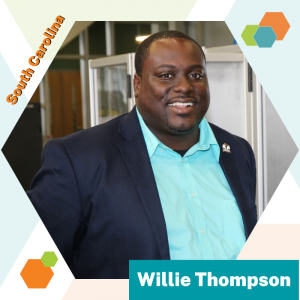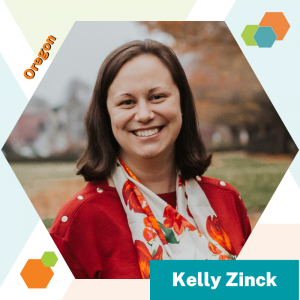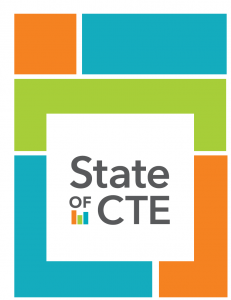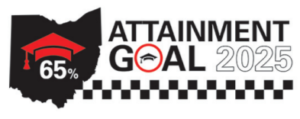Advance CTE and ECMC Foundation are excited to introduce the Fellows of the third cohort of The Postsecondary State Career Technical Education (CTE) Leaders Fellowship at Advance CTE—Sponsored by ECMC Foundation. The Advance CTE — ECMCF Fellows include representation across multiple demographic categories reflecting the Fellowship’s goal of intentionally building a postsecondary leadership pipeline for underserved populations in Career Technical Education (CTE) that closes racial representation gaps and removes equity barriers to postsecondary leadership advancement.
Over the last few days, this blog series has introduced 15 of the 20 Fellows participating in the third cohort of emerging leaders from across 16 states and one U.S. territory. The remaining five Fellows will be introduced in this final blog of this series.
 Willie Thompson is a South Carolina native born in Sumter SC. Willie is married with two young boys. He has a Bachelor of Science in Electronic Communications Engineering Technology. Willie has eight years of industry experience. Willie’s previous roles were quality technician field service engineer, and quality engineer. Willie has been at Greenville Technical College for six years and has been academic program director of mechatronics for the last three years. Willie is a member of the American Society of Mechanical Engineers (ASME) Greenville Section. Willie also teaches the Creative Inquiry course where select students help solve real world advanced manufacturing projects in the THINKER Program alongside Clemson Automotive Engineering Grad students. Willie serves as a mentor for the African American Males Scholars Initiative (AAMSI) program. Willie loves supporting the students and helping students achieve their goals to become successful.
Willie Thompson is a South Carolina native born in Sumter SC. Willie is married with two young boys. He has a Bachelor of Science in Electronic Communications Engineering Technology. Willie has eight years of industry experience. Willie’s previous roles were quality technician field service engineer, and quality engineer. Willie has been at Greenville Technical College for six years and has been academic program director of mechatronics for the last three years. Willie is a member of the American Society of Mechanical Engineers (ASME) Greenville Section. Willie also teaches the Creative Inquiry course where select students help solve real world advanced manufacturing projects in the THINKER Program alongside Clemson Automotive Engineering Grad students. Willie serves as a mentor for the African American Males Scholars Initiative (AAMSI) program. Willie loves supporting the students and helping students achieve their goals to become successful.
 Dr. Brittani Williams is the director of advocacy policy & research at Generation Hope, a national nonprofit dedicated to ensuring student parents succeed, achieve economic mobility, and build wealth. She recently earned her doctorate. in educational leadership policy from Texas Tech University, with a dissertation focusing on Black women navigating four-year degree programs. With over 10 years of experience in higher education administration, policy, and research at the institutional, state, and federal levels, Dr. Williams is deeply committed to advancing high-quality and equitable CTE. Her work emphasizes the importance of CTE in supporting state leadership to develop policies, programs, and pathways that ensure career and college success for parenting learners.
Dr. Brittani Williams is the director of advocacy policy & research at Generation Hope, a national nonprofit dedicated to ensuring student parents succeed, achieve economic mobility, and build wealth. She recently earned her doctorate. in educational leadership policy from Texas Tech University, with a dissertation focusing on Black women navigating four-year degree programs. With over 10 years of experience in higher education administration, policy, and research at the institutional, state, and federal levels, Dr. Williams is deeply committed to advancing high-quality and equitable CTE. Her work emphasizes the importance of CTE in supporting state leadership to develop policies, programs, and pathways that ensure career and college success for parenting learners.
 Kellise Williamson is an experienced higher education professional, born and raised in Baltimore City. Her vision is to support high school students and adult learners in accessing postsecondary and career opportunities. Kellise currently serves as the postsecondary credit and P-TECH coordinator with the Maryland State Department of Education (MSDE) within the Office of College and Career Pathways. Her role includes serving as the statewide dual enrollment liaison, P-TECH program manager, and articulation agreement coordinator. Her experience includes providing leadership, management, and supervision to local education agencies and postsecondary institutions in support of dual enrollment and CTE programs. Kellise’s work supports practitioners by providing guidance with implementing dual enrollment programs under the Blueprint for Maryland’s Future. She earned her Master of Science in Higher Education Administration and Organizational Management from Drexel University and her Bachelor of Arts degree in journalism from Pennsylvania State University.
Kellise Williamson is an experienced higher education professional, born and raised in Baltimore City. Her vision is to support high school students and adult learners in accessing postsecondary and career opportunities. Kellise currently serves as the postsecondary credit and P-TECH coordinator with the Maryland State Department of Education (MSDE) within the Office of College and Career Pathways. Her role includes serving as the statewide dual enrollment liaison, P-TECH program manager, and articulation agreement coordinator. Her experience includes providing leadership, management, and supervision to local education agencies and postsecondary institutions in support of dual enrollment and CTE programs. Kellise’s work supports practitioners by providing guidance with implementing dual enrollment programs under the Blueprint for Maryland’s Future. She earned her Master of Science in Higher Education Administration and Organizational Management from Drexel University and her Bachelor of Arts degree in journalism from Pennsylvania State University.
 Mike Woods, an influencer in CTE, has dedicated his career to enhancing educational opportunities for all students, including those with disabilities and non-traditional backgrounds. After teaching agricultural science and advising FFA programs in Pennsylvania, he joined the Association for Career and Technical Education® (ACTE) as the state association liaison for region one. This role helped him build a vast network of CTE partners in the Northeast and connect with the CTE Technical Assistance Center (CTE TAC) of New York and Successful Practices Network. Currently, as the director of the CTE TAC of New York, Mike and his team focus on providing high-quality professional learning opportunities for CTE administrators, faculty, and staff across New York State. A firm believer that representation matters, his efforts emphasize diversity, equity, and inclusion (DEI), aiming to empower educators and improve CTE for all students in secondary and postsecondary career pathways.
Mike Woods, an influencer in CTE, has dedicated his career to enhancing educational opportunities for all students, including those with disabilities and non-traditional backgrounds. After teaching agricultural science and advising FFA programs in Pennsylvania, he joined the Association for Career and Technical Education® (ACTE) as the state association liaison for region one. This role helped him build a vast network of CTE partners in the Northeast and connect with the CTE Technical Assistance Center (CTE TAC) of New York and Successful Practices Network. Currently, as the director of the CTE TAC of New York, Mike and his team focus on providing high-quality professional learning opportunities for CTE administrators, faculty, and staff across New York State. A firm believer that representation matters, his efforts emphasize diversity, equity, and inclusion (DEI), aiming to empower educators and improve CTE for all students in secondary and postsecondary career pathways.
 Kelly Zinck is the education team research analyst at the Oregon Higher Education Coordinating Commission (HECC), Office of Community Colleges and Workforce Development (CCWD). In this role, she manages data for both the Workforce Innovation and Opportunity Act (WIOA) Title II and CTE Perkins programs, ensuring accurate, timely, and transparent federal reports and administering the Title II performance-based funding model. Kelly is committed to empowering collaborative partners by providing the tools and knowledge necessary to enhance program effectiveness and promote equitable opportunities. She provides technical assistance and professional development responsive to program needs, tailored to individual expertise, and aligned with statewide objectives. Kelly’s approach to data is guided by her dedication to data equity and literacy. She strives to translate complex data into meaningful and actionable insights, fostering a culture of data-driven decision-making among colleagues and collaborative partners. Kelly holds a master’s degree in public policy.
Kelly Zinck is the education team research analyst at the Oregon Higher Education Coordinating Commission (HECC), Office of Community Colleges and Workforce Development (CCWD). In this role, she manages data for both the Workforce Innovation and Opportunity Act (WIOA) Title II and CTE Perkins programs, ensuring accurate, timely, and transparent federal reports and administering the Title II performance-based funding model. Kelly is committed to empowering collaborative partners by providing the tools and knowledge necessary to enhance program effectiveness and promote equitable opportunities. She provides technical assistance and professional development responsive to program needs, tailored to individual expertise, and aligned with statewide objectives. Kelly’s approach to data is guided by her dedication to data equity and literacy. She strives to translate complex data into meaningful and actionable insights, fostering a culture of data-driven decision-making among colleagues and collaborative partners. Kelly holds a master’s degree in public policy.
To learn more about the Fellowship, the Fellows of Cohort 3, and the alumni of the Fellowship, please visit https://careertech.org/what-we-do/initiatives/postsecondary-state-cte-leaders-fellowship/


 States make significant contributions to CTE programs through non-categorical, line item appropriations. Programmatic funding is distributed through periodic, legislatively established authorizations that are contingent on the availability of funds. States often place conditions on how money should be spent or used to promote state priorities. Additionally, a programmatic line item appropriation can be a recurring or a one-time investment. This blog highlights appropriations in industry-recognized credentials, Career Technical Student Organizations (CTSOs), career advisement, and educator preparation for fiscal year (FY) 2022. You can read more about categorical funding in the first blog in this series,
States make significant contributions to CTE programs through non-categorical, line item appropriations. Programmatic funding is distributed through periodic, legislatively established authorizations that are contingent on the availability of funds. States often place conditions on how money should be spent or used to promote state priorities. Additionally, a programmatic line item appropriation can be a recurring or a one-time investment. This blog highlights appropriations in industry-recognized credentials, Career Technical Student Organizations (CTSOs), career advisement, and educator preparation for fiscal year (FY) 2022. You can read more about categorical funding in the first blog in this series,  Additional Resources
Additional Resources The 2022 school year heralded the start of another new initiative for the District of Columbia’s Office of the State Superintendent of Education (OSSE)- the
The 2022 school year heralded the start of another new initiative for the District of Columbia’s Office of the State Superintendent of Education (OSSE)- the  In the coming months, Advance CTE will release a series of four briefs to share strategies put in place by the PDI states to advance postsecondary CTE data quality and use. The first brief explores how postsecondary CTE data can be used in support of state education and workforce goals, and features
In the coming months, Advance CTE will release a series of four briefs to share strategies put in place by the PDI states to advance postsecondary CTE data quality and use. The first brief explores how postsecondary CTE data can be used in support of state education and workforce goals, and features  The second brief advances a theory of change for centering learners in postsecondary CTE data collection and use, featuring the
The second brief advances a theory of change for centering learners in postsecondary CTE data collection and use, featuring the  The Strengthening Career and Technical Education for the 21st Century Act (Perkins V) places a strong emphasis on the alignment of Career Technical Education (CTE) programs of study with state, regional and local economies. The legislation requires Perkins-funded programs to prepare students for “high-skill, high-wage, or in-demand occupations.” These terms — high skill, high wage and in demand — are foundational to Perkins V, appearing in both the purpose of the law and the definition of CTE.
The Strengthening Career and Technical Education for the 21st Century Act (Perkins V) places a strong emphasis on the alignment of Career Technical Education (CTE) programs of study with state, regional and local economies. The legislation requires Perkins-funded programs to prepare students for “high-skill, high-wage, or in-demand occupations.” These terms — high skill, high wage and in demand — are foundational to Perkins V, appearing in both the purpose of the law and the definition of CTE. Similarly, in Ohio, three community colleges
Similarly, in Ohio, three community colleges